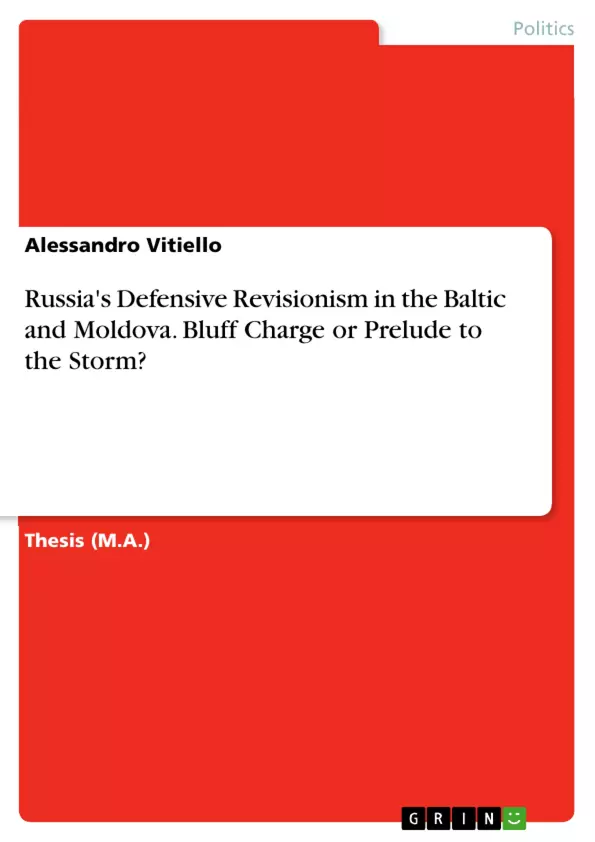This work focuses on the concept of revisionism and on its significance for explaining Russia’s current strategy towards Eastern Europe. It explores its evolution – or applicability – through theoretical debates. By suggesting a new perspective to the studies on revisionism, it highlights the impact of Russia’s foreign policy in Eastern Europe, by providing deductions on the Baltic and Moldova. How defensive-revision-prone are these contexts?
This work focuses on the concept of revisionism and on its significance for explaining Russia’s current strategy towards Eastern Europe. It explores its evolution – or applicability – through theoretical debates. The literature of international relations (IR) is diverse. Some theories such as Liberalism adopt this concept, others do not. Though, only Realism has examined it in depth, by questioning – for instance – what are its relevant causes. The realist theoretical framework maintains that the international system be anarchic and that, consequently, states fear each other and seek survival. It undoubtedly displays an internal tension between defensive and offensive views.
This distinction is reflected in the study of revisionism. Defensive realists argue that states tend to avoid interstate conflicts due to systemic conditions. Opposing Mearsheimer and the offensive assumption that states be belligerent, Schweller, Snyder, Zakaria – among other – develop the waltzian defensive perspective to explain such lack of incentives for expansionism. Consequently, they stress the importance of domestic variables and of the context.
This work identifies with the latter approach. It develops a theoretical model of revisionism. More specifically, a precise kind, centred on inner mechanisms and on defensive dimension of this concept. Yet, is there a possible defensive revisionism? Theory has still not well-developed such concept. Realism indeed, by debating on the issue of revisionist states only provides an interstate model which only explains the offensive dimension of this concept. Though, how to explain border modelling without such schema? Transborder issues, overall since the collapse of the Soviet Union in 1991 and the end of the bipolar phase, represent a major source of conflicts. Within the post-Soviet space, they acquire a central importance. Which mechanisms affect this area, and how a defensive revisionism may represent an impact for these countries?
Inhaltsverzeichnis (Table of Contents)
- Preface
- Introduction
- Chapter One. Evaluating Russia's revisionism. The analytical debate.
- Literature Review
- The defensive model for Russia's revisionism
- Conception of peaceful means
- The ultimate objective. Reintegration
- Methodology
- Chapter Two. Application and impact of a revisionist agenda: a methodological approach to Russia's revisionism means
- Peaceful means
- The concept of Russkij Mir
- The New Generation Warfare.
- Chapter Three. Case Studies.
- Establishing the Minority-Majority relation
- The ethnic minority between discrimination and protection
- The military context of the Baltic: the impact of Russia and NATO's response
- Establishing the Minority-Majority relation
- Russia's impact on Moldova: the country and its future arrangement
- The Russian military impact for the Moldovan political context
Zielsetzung und Themenschwerpunkte (Objectives and Key Themes)
This work aims to analyze Russia's revisionist policy in the Baltic states and Moldova, exploring its motivations, strategies, and potential impact. The author argues that Russia's revisionism is not simply aggressive expansionism, but rather a form of "defensive revisionism" driven by a desire to reassert its influence in its perceived sphere of interest.
- Russia's Revisionism: Motives and Strategies
- The Role of Ethnic Minorities in Russia's Foreign Policy
- The Impact of Russia's Military Modernization
- The Security Dilemma in the Baltic and Moldova
- The Potential for Conflict and Cooperation
Zusammenfassung der Kapitel (Chapter Summaries)
Chapter One introduces the concept of revisionism in international relations theory and examines how different theoretical perspectives view Russia's foreign policy. The chapter then develops a model of "defensive revisionism" and proposes a methodology for analyzing Russia's revisionist agenda.
Chapter Two explores the peaceful and military means employed by Russia to achieve its revisionist goals. The chapter examines the role of international law, media, and economic dynamics in shaping Russia's influence, as well as the concept of "Russkij Mir" and its impact on ethnic minorities. The chapter also analyzes the evolution of Russia's military strategy, particularly the "New Generation Warfare".
Chapter Three presents two case studies: the Baltic States and Moldova. It analyzes the interplay of ethnic tensions, military posturing, and political developments in each region, highlighting the complexities of Russia's revisionist approach.
Schlüsselwörter (Keywords)
This study focuses on key concepts such as Russia's revisionism, defensive revisionism, international relations theory, ethnic minorities, military strategy, "Russkij Mir", the Baltic States, Moldova, and the security dilemma.
Frequently Asked Questions
What is "defensive revisionism" in the context of Russia's foreign policy?
It is a strategy driven by a desire to reassert influence in perceived spheres of interest for survival and security, rather than pure aggressive expansionism.
What does the concept "Russkij Mir" signify?
"Russkij Mir" (Russian World) is a cultural and political concept used to project Russian influence and protect Russian-speaking minorities abroad.
What is "New Generation Warfare"?
It is Russia's evolved military strategy that combines conventional force with psychological, informational, and asymmetric tactics.
How does Russia impact Moldova's political context?
Russia exerts influence through military presence, support for minorities, and economic dynamics to shape Moldova's future alignment.
What is the security dilemma in the Baltic states?
It refers to the tension between Russia's revisionist goals and NATO's defensive response, creating a complex military and political environment.
- Quote paper
- Alessandro Vitiello (Author), 2018, Russia's Defensive Revisionism in the Baltic and Moldova. Bluff Charge or Prelude to the Storm?, Munich, GRIN Verlag, https://www.grin.com/document/520679



